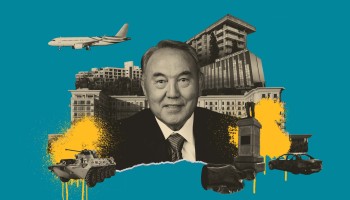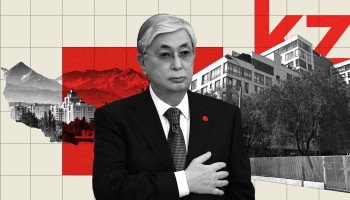Nazarbayev ruled the country since it gained independence after the dissolution of the Soviet Union until 2019 when he stepped down but continued to rule from the shadows thanks to his handpicked successor. He lost power completely after mass protests at the beginning of this year.
Based on financial statements of the Jusan Bank, the lawmakers concluded that the bank got about US$3,9 billion from the state budget between 2017-2019 on “preferential terms” and then modified its obligations to the state.
The bank converted about $907 million from “highly profitable deposits” to “long-term obligations with meager profitability,” the MPs wrote in their request submitted to the prime minister.
This way the bank profited some $275 million and paid $250 million in dividends to its shareholders.
“It seems that the shareholders of the Bank, instead of lending it to businesses, almost completely withdrew the taxpayer’s state aid from the bank’s capital directly into their pockets,” the MPs wrote.
The lawmakers asked the prime-minister to analyze the efficiency of the state aid provided to Jusan Bank over the previous five years and develop a plan on how the money will be returned to the state budget.
Jusan Bank didn’t comment the initiative but its PR Director Olegzhan Beketayev told in his recent interview to a marketing website that “the Bank became more open” and stated that all profits of the Bank go to Nazarbayev University and the Nazarbayev Intellectual Schools.
Beketayev’s claims cannot be independently confirmed as neither the university nor the schools nor the Nazarbayev Foundation have published their financial statements and reports.
OCCRP found earlier this year that a chain of foundations established by Nazarbayev controls assets of more that $8 billion. The Nazarbayev Foundation is the main foundation in the chain and through different structures it controls not only Jusan Bank but also shares in mobile operators, insurance and investment companies, fintech companies and others.
After the January unrest in Kazakhstan that was triggered by the rise of fuel prices but quickly focused on Nazarbayev, the Jusan Bank changed its board of directors and its CEO. Nazarbayev said in a recent interview that all financial activities of the Foundation and the University were under the control of Karim Massimov, who was officially the head of the board of the Nazarbayev University. Massimov, who was chief of the Committee of National Security for the last five years, was arrested in early January and accused of corruption, treason and of having attempted to seize power.






